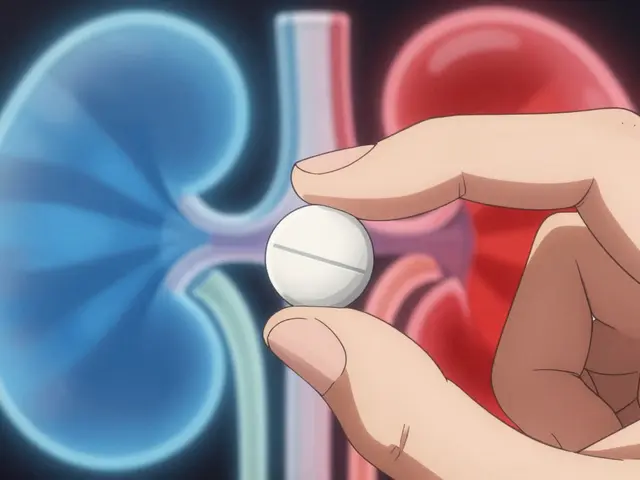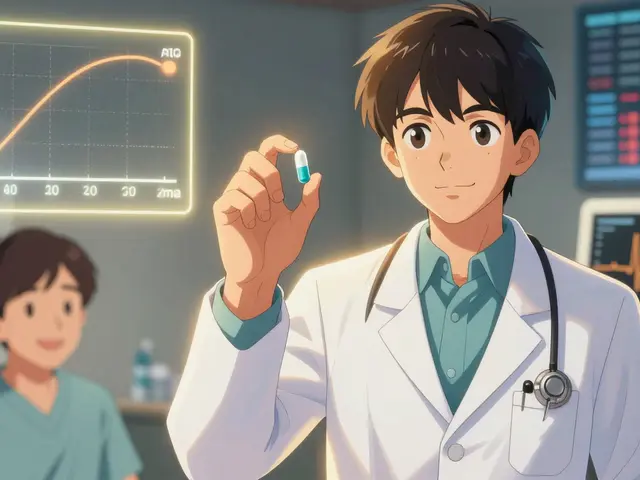Acne Treatment Decision Guide
Find Your Best Acne Treatment
This guide helps you determine the most appropriate acne treatment based on your specific situation. Answer a few questions to get personalized recommendations.
1. How severe is your acne?
2. Are you pregnant or could you become pregnant?
3. How comfortable are you with regular blood tests?
4. What is your budget consideration?
5. What are your long-term goals?
Your Recommended Treatment
Key Considerations
When treating severe acne, Isofair is a prescription oral retinoid whose active ingredient is isotretinoin, a vitamin A derivative that targets the root causes of acne by reducing oil production, normalizing skin cell turnover, and curbing inflammation.
If you’re wondering whether Isofair is the right choice, keep reading. This guide walks you through how Isofair works, its pros and cons, and how it stacks up against the most frequently prescribed alternatives.
What Is Isofair (Isotretinoin) Exactly?
Isofair is the Australian brand name for isotretinoin, the same compound that was famously sold as Accutane in the United States. The drug belongs to the retinoid class, which is chemically related to vitamin A. By binding to nuclear receptors in skin cells, isotretinoin changes gene expression, leading to smaller sebaceous glands and less oily skin.
Key attributes of Isofair:
- Drug class: Oral retinoid
- Typical dose: 0.5-1 mg/kg per day, adjusted based on response and side‑effects
- Treatment length: 15-20 weeks (usually one full course)
- Success rate: 80-90% of patients achieve clear or almost clear skin after a single course
How Isofair Works - The Science in Plain English
Three main mechanisms drive its effectiveness:
- Sebum suppression: Glands shrink, producing up to 90% less oil.
- Cell turnover normalization: Skin cells shed at a regular pace, preventing clogged pores.
- Anti‑inflammatory action: Reduces the bacterial overgrowth that fuels acne lesions.
Because it tackles the cause rather than just the symptoms, results tend to be long‑lasting. However, the systematic nature of the drug also means it can affect the whole body, which is why monitoring is essential.
Safety Profile - What to Watch Out For
Isofair’s side‑effects are well documented. The most common ones include dry lips, dry skin, and mild nosebleeds. More serious concerns are:
- Elevated liver enzymes - requires routine blood tests.
- Increased triglycerides - diet and occasional medication may be needed.
- Potential birth defects - absolutely contraindicated during pregnancy; strict contraception is mandatory.
- Rare psychiatric effects - mood changes should be reported immediately.
Because of these risks, dermatologists usually reserve Isofair for patients who have not responded to other treatments.
Typical Prescription Process
Before you get a script, expect the following steps:
- A thorough skin assessment and discussion of medical history.
- Baseline blood work (liver function, lipid profile, pregnancy test for women of child‑bearing age).
- Education on contraception, side‑effects, and the need for monthly follow‑up labs.
- Gradual dose adjustments based on tolerability and acne response.
Compliance with follow‑up visits is crucial; the majority of adverse events show up in the first two months.

Alternatives to Isofair - An Overview
When Isofair isn’t suitable, dermatologists turn to a toolbox of other options. Below are the most common alternatives, each introduced with its own microdata block.
Accutane is the original U.S. brand name for isotretinoin, sharing the same dosage guidelines and side‑effect profile as Isofair.
Doxycycline is a tetracycline‑class oral antibiotic that reduces inflammation and bacterial growth. Typical courses last 3-6 months at 100mg twice daily.
Adapalene is a topical retinoid available over‑the‑counter (0.1% gel) that normalizes cell turnover with fewer systemic side‑effects than oral retinoids.
Tretinoin is a prescription‑only topical retinoid (0.025-0.1%) that works similarly to adapalene but is often more irritating.
Spironolactone is a hormonal antagonist used primarily in women; it reduces androgen‑driven oil production.
Benzoyl peroxide is an over‑the‑counter antibacterial that kills Propionibacterium acnes and helps keep pores clear.
Azelaic acid is a gentle topical agent (15-20% cream) that reduces inflammation, kills bacteria, and brightens post‑acne marks.
Side‑by‑Side Comparison Table
| Attribute | Isofair (Isotretinoin) | Doxycycline | Adapalene (Topical) | Spironolactone | Benzoyl Peroxide |
|---|---|---|---|---|---|
| Drug class | Oral retinoid | Oral tetracycline antibiotic | Topical retinoid | Hormonal antagonist | Topical oxidizing agent |
| Typical course length | 15-20 weeks | 12-24 weeks | Indefinite (maintenance) | Indefinite (maintenance) | Indefinite (maintenance) |
| Success rate (clear skin) | 80-90% | 30-50% | 40-60% | 20-30% (women only) | 25-35% |
| Systemic side‑effects | Yes - liver, lipids, teratogenicity | Yes - GI upset, photosensitivity | Minimal (local irritation) | Yes - electrolyte imbalance, dizziness | Minimal (local dryness) |
| Prescription required | Yes | Yes | Over‑the‑counter (0.1% in AU) | Yes | Over‑the‑counter |
| Best for | Severe nodular cystic acne, refractory cases | Mild‑to‑moderate inflammatory acne | Comedo‑dominant acne, maintenance | Hormonal acne in females | Early‑stage acne, oil control |
How to Choose the Right Treatment for You
Think of the decision as a simple checklist:
- Severity: If you have deep cysts or scarring risk, Isofair is often the only option that can halt damage.
- Pregnancy potential: Women who could become pregnant should avoid Isofair and consider topical retinoids or spironolactone.
- Tolerance for labs: If regular blood work feels burdensome, an antibiotic or topical may be preferable.
- Budget: Oral isotretinoin can be pricey in Australia; generics may lower cost, but insurance coverage varies.
- Long‑term plan: Some patients start with a short course of doxycycline, switch to a retinoid, then maintain with adapalene.
Discuss these factors with a dermatologist-personal medical history often tips the scales.
Common Myths About Isofair (Isotretinoin)
Myth 1: It’s just a stronger version of acne cream. Fact: It works systemically, reshaping oil glands from the inside out.
Myth 2: A single dose cures acne forever. Fact: Most patients need the full 15‑week course; a small percentage relapse and may need a second cycle.
Myth 3: It causes permanent joint pain. Fact: Joint aches are usually mild and resolve after treatment ends.

Potential Interactions and Contraindications
Because Isofair is a potent retinoid, it should not be mixed with:
- Vitamin A supplements - risk of hypervitaminosis.
- Other retinoids (topical tretinoin, adapalene) - excessive irritation.
- Pregnancy - absolutely contraindicated; effective contraception is non‑negotiable.
- Medications that affect liver enzymes (e.g., phenytoin, barbiturates) - may alter drug levels.
Always hand your full medication list to your prescriber.
What to Expect After Starting Isofair
Most patients notice a “purging” phase during the first 4-6 weeks: existing lesions may get worse before they improve. This is a sign the drug is working. Moisturizers, lip balms, and gentle cleansers can ease discomfort.
By the 3‑month mark, the majority report fewer new lesions and a visible reduction in redness and swelling. Follow‑up labs are usually taken at weeks 4, 8, and 12 to monitor liver function and lipid levels.
Key Takeaways
- Isofair is the most effective single‑agent therapy for severe, scarring‑prone acne.
- It requires strict monitoring, contraception, and a commitment to a 4‑month regimen.
- Alternative options exist for milder cases, pregnancy‑concerned patients, or those preferring topical solutions.
- Choosing the right treatment hinges on severity, safety, lifestyle, and cost.
Frequently Asked Questions
Can I combine Isofair with a topical retinoid?
Usually no. Using two retinoids together raises the risk of severe dryness and skin irritation. Dermatologists often advise stopping the topical while on isotretinoin, then re‑introducing it after the course ends.
How long does it take to see results?
Visible improvement typically appears after 6-8 weeks, but the full benefit isn’t evident until the end of the 15‑20week treatment.
Is Isofair safe for teenagers?
Yes, when prescribed by a dermatologist experienced with teen patients and when strict lab monitoring is followed. However, doctors often try milder options first.
What happens if I become pregnant while on Isofair?
Isotretinoin is highly teratogenic. Pregnancy must be avoided during treatment and for at least one month after stopping the drug. Immediate discontinuation and a thorough medical review are required if pregnancy occurs.
Do I need to continue any skincare after the course?
Yes. A gentle cleanser, non‑comedogenic moisturizer, and sunscreen are essential to maintain results and protect the new skin barrier.





Jen Basay
October 15, 2025 AT 21:58I've seen a lot of people swear by Isofair when they're stuck with cystic breakouts, and the way it slashes oil production is pretty wild :)
Hannah M
October 16, 2025 AT 17:25Totally feel you on the dryness-using a good moisturizer and a lip balm can make the first weeks way more bearable. 😌
mausumi priyadarshini
October 17, 2025 AT 12:51Honestly, while the guide lists all the side‑effects, one must remember that the blood work is not just a formality, it's a lifesaver, especially for those with hidden liver issues!!!
Taryn Bader
October 18, 2025 AT 08:18Wow, the drama of watching a breakout turn into a clear canvas is like watching a thriller unfold-except the hero is a pill.
Myra Aguirre
October 19, 2025 AT 03:45Dry skin is the worst.
Shawn Towner
October 19, 2025 AT 23:11One could argue that the allure of Isofair lies not merely in its efficacy but in the cultural capital it confers upon those who endure its rigorous monitoring, a notion that often goes unremarked in mainstream discourse.
Ujjwal prakash
October 20, 2025 AT 18:38The pharmacodynamics of isotretinoin make it a unique tool in the dermatologist's arsenal, but its systemic reach demands a respect that many patients underestimate.
First, the drug's ability to shrink sebaceous glands is anchored in its interaction with nuclear retinoic acid receptors, fundamentally reprogramming gene expression.
This down‑regulation of sebum synthesis translates to a visible reduction in oily shine within weeks, which is often the clearest early indicator of efficacy.
Second, normalizing keratinocyte turnover prevents the micro‑comedones that would otherwise clog pores, offering a preventative layer to the treatment.
Third, its anti‑inflammatory properties dampen the cytokine cascade that fuels pustular eruptions, resulting in calmer lesions.
However, the systemic nature of these mechanisms is a double‑edged sword, as the same receptors exist in hepatic and lipid pathways.
Consequently, elevations in liver enzymes and triglycerides are not rare, and they justify the routine blood panels outlined in the guide.
Moreover, the teratogenic risk remains the most serious contraindication, demanding strict contraception protocols that can be burdensome for some patients.
Psychological side‑effects have been reported anecdotally, though causality remains debated, urging clinicians to monitor mood changes closely.
From a practical standpoint, the “purging” phase during the first month can be demoralizing, as existing lesions may flare before improvement.
Patients often find relief by layering gentle moisturizers, avoiding harsh exfoliants, and maintaining a consistent skincare routine.
The cost factor should not be ignored; while generics exist, insurance coverage varies widely across regions, adding a financial layer to the decision‑making process.
In comparative terms, alternatives like doxycycline or topical retinoids present fewer systemic risks but also generally lower clearance rates.
For individuals with severe nodular acne resistant to other therapies, the risk‑benefit calculus frequently tips in favor of isotretinoin.
Ultimately, the decision rests on a collaborative discussion that weighs severity, lifestyle, and personal tolerance for monitoring.
Maintaining open communication with the dermatologist ensures that any adverse signals are caught early, preserving both safety and the likelihood of a lasting clear‑skin outcome.
Cindy Knox
October 21, 2025 AT 14:05Reading through the guide felt like watching a lush novel unfold-each chapter revealing another layer of why Isofair can be a game‑changer, especially when other treatments have failed.
scott bradshaw
October 22, 2025 AT 09:31Sure, but all that science doesn’t change the fact that a pricey pill for a few months still smells like a marketing gimmick.
Jeff Bellingham
October 23, 2025 AT 04:58While the exposition is thorough, it would benefit from a concise summary of monitoring intervals to aid clinicians in quickly referencing the requisite laboratory schedule.
Matthew Balbuena
October 24, 2025 AT 00:25Yo, keep that moisturizer game strong-if you forget the lip balm, you’ll be chapping like a desert, and no one wants that, trust me!
Bansari Patel
October 24, 2025 AT 19:51Dryness, in many ways, mirrors the human condition: a surface tension that signals deeper transformations beneath, reminding us that comfort often follows struggle.
Rebecca Fuentes
October 25, 2025 AT 15:18The dramatic metaphor employed aptly captures the patient’s journey; nevertheless, it is essential to contextualize such descriptions within evidence‑based outcomes to maintain scholarly rigor.